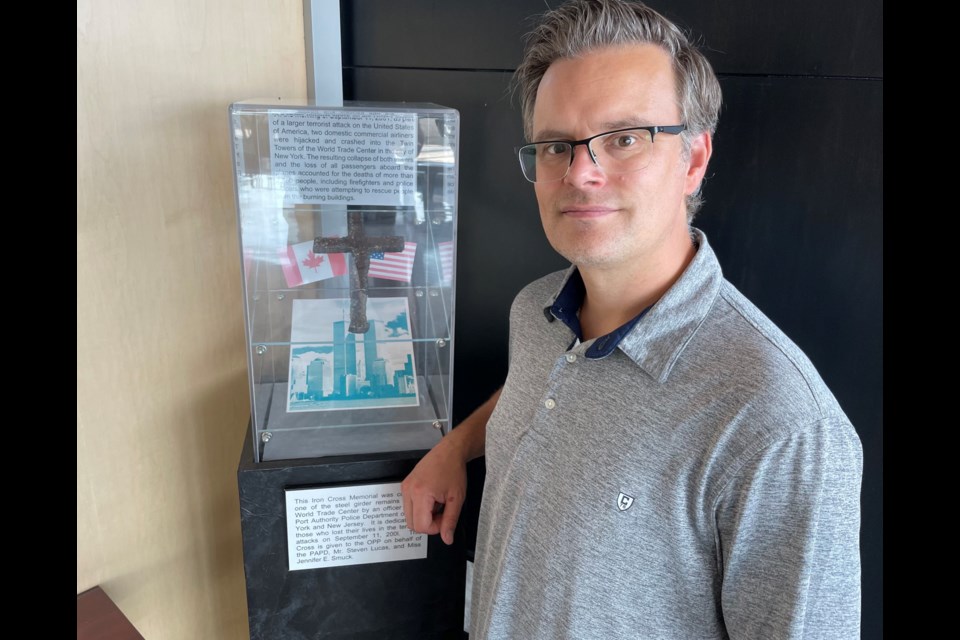Just three months removed from the terrorist attacks on Sept. 11, 2001, Orillia's Jeff Pitcher made his way to Ground Zero in New York City.
When American Airlines Flight 11 crashed into floors 93-99 of the North Tower of the World Trade Center, the then 19-year-old Pitcher was on campus at the University of Western Ontario.
“I remember walking through the student centre and seeing everyone around the TV looking at the World Trade Centre buildings,” he explained. “I was quite concerned about the people in the building and their safety.”
Along with the world, Pitcher watched live as the day’s events unfolded.
“There was a sense of sadness for the people who lost their lives and their families,” he said. “There was also a state of shock that in North America we could be exposed to terrorism.”
As someone who was working on his degree of nursing and science at the time, Pitcher — now a doctor in Orillia — couldn’t help but think of the first responders who would be tasked with going into the dangerous situation.
“I knew from the news that there were firefighters, paramedics, and anybody who could help running into the buildings,” he said. “Certainly, I was concerned for their safety as well.”
The former Twin Lakes Secondary School student immediately decided that he wanted to help, so he signed himself up to go down to Ground Zero with the Salvation Army’s Emergency Disaster Services. He felt a desire to provide support to rescue workers who had been at Ground Zero since the day of the attacks.
“I put my name on the roster for Salvation Army Canada,” he explained. “Subsequently they asked me if I would go over at Christmas time in 2001.”
While going through the airport less than 100 days after the hijackings, Pitcher said there was a noticeably high security presence.
“In New York they actually had the National Guard at the airport patrolling with large guns,” he said, noting that it helped him feel safe.
While on the airplane, Pitcher said he felt uneasy.
“I remember I couldn’t help but think about the people who were on the hijacked airplanes,” he said. “I thought about how terrifying that must have been to go through that.”
Pitcher spent most of the flight feeling emotional about the lives lost and reflecting on the events of the tragedy. He became even more emotional once his flight landed and he approached Ground Zero.
“It certainly brought tears to my eyes when I saw the site,” he said.
Pitcher says rubble and damage was everywhere.
“For perspective, I’m guessing it would have been from maybe Soldiers’ Memorial Hospital to down by the water,” he explained. “That’s how big the site was, and all the buildings within that vicinity were gone, just destroyed.”
Pitcher felt that the site needed to be respected and used to honour the victims.
“I remember along the fencing around the site there were pictures of loved ones that were missing; they were put up immediately after the disaster happened,” he said. “It was very emotional to look at each one of those pictures, the families, and lives lost there.”
While inside Ground Zero, Pitcher was one of 32,000 volunteers who provided food, hydration, supplies, grief counselling, financial assistance, referrals, and more to thousands of emergency workers, families of victims, and others impacted by the attacks.
“Every day I was there all the work on the site would stop when they found a body,” he explained. “All the workers would line up in procession while they removed any of the bodies that were found.”
Quite often, the victims found would be a firefighter; 343 of them were killed in the attacks. Pitcher remembers taking some time to talk to firefighters from a station that was located across the street from the World Trade Centre.
“I heard their stories from that day and when they ran into the buildings,” he said. “Certainly, their lives were changed forever. It was amazing seeing these heroes who run into the face of danger, it was very inspiring.”
Pitcher’s experience at Ground Zero was eye-opening, he says.
“We feel safe in North America,” he said. “We have a free country, we can walk down the street without any fear of attacks in general, and we took that for granted before Sept. 11.”
The now 40-year-old has gone on to join forces with the Salvation Army to aid victims of Hurricane Katrina, Ukraine, and other disasters throughout the world.
“My experience in volunteering at Ground Zero has certainly shaped me and my career choices,” he said. “I’ve chosen a career of medicine in a family practice and also in an emergency.”
Every Sept. 11, Pitcher takes the time to reflect on his experience at Ground Zero.
“It’s certainly something that is always on my mind,” he said. “I think about the victims, their families, and the lives that were lost.”



